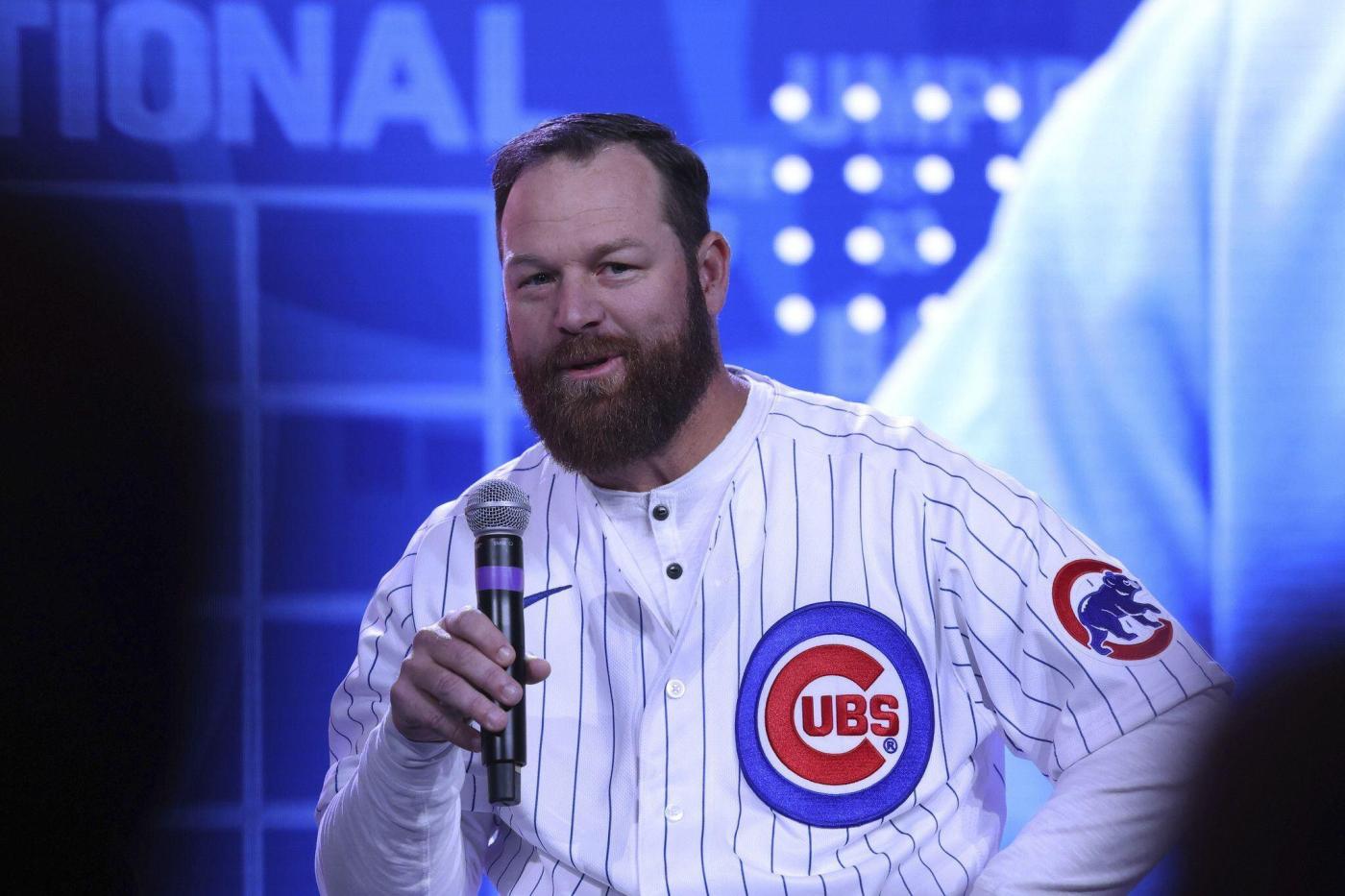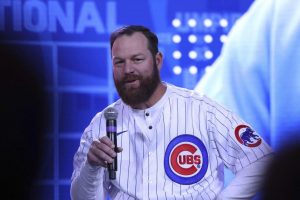
How new lefty slugger Michael Busch fits the Chicago Cubs’ offensive needs: ‘He’s going to get an opportunity’
Michael Busch’s whirlwind 72 hours brought him to Chicago, where he quickly got to know his new organization and Cubs fans.
Busch, traded Thursday from the Los Angeles Dodgers to the Cubs as the headliner in a four-player deal, lauded the smooth transition amid his first taste of the fandom during the Cubs Convention. He even participated in the annual kids-only news conference alongside teammates Patrick Wisdom, Adbert Alzolay and Pete Crow-Armstrong. He deftly handled the kids’ hard-hitting questions that ranged from his favorite color (Cubbie red) to why he chose to wore No. 29 (liked it best among the numbers offered). He even broke out a couple of dance moves.
“Thank God ‘The Griddy’ has been around a little bit so I had to do it a couple times before,” a smiling Busch said afterward.
Only 26, Busch’s potential and power stroke could quickly turn him into a fan favorite. He gives the Cubs exactly what they needed this offseason: a left-handed power hitter who can play the corner infield positions. Busch is expected to primarily play first base but also possesses the flexibility to play multiple infield and outfield positions.
Busch didn’t enter the offseason mentally preparing for a trade, instead focusing on each day and not worrying about things he can’t control. With the Dodgers moving Mookie Betts to second base for 2024, it further clogged the possibilities of regular at-bats in the majors after Busch appeared in 27 games last season in his first taste of the big leagues.
“Going forward, I just try to take it one step at a time and the competition part of sports, I think is good for people,” Busch said. “No matter who you are, what you’ve done, just walking into the clubhouse to the locker room to the field every day with that mindset of just getting better that day. At the end of the day, all you can ask for as a player is the opportunity to get out there and show what you’ve been working for and working on the last few years.”
Hitting coach Dustin Kelly represents a friendly face for Busch.
During Kelly’s three years (2018-20) as a hitting coach in the Dodgers farm system, he worked with Busch, a 2019 first-round pick. When COVID-19 ended 2020 spring training prematurely, the Dodgers created small hitting groups, talking one to two times a week as well as Zoom calls for video sessions. Busch was among the hitters in Kelly’s group. From March until July, Kelly and Busch chatted roughly 10 times a month. After the minor-league season was canceled, Busch was part of the Dodgers’ alternate camp site where Kelly worked with the hitters.
“Any time anybody that you know makes the big leagues, you’re super happy for them and proud of them,” Kelly told the Tribune on Saturday. “But there was a little extra special feeling for it just because we had spent so much time that year together.”
Busch said his swing hasn’t changed a ton since he last worked with Kelly, though he figures it might have evolved a little over the last three years.
“He’s adapted to every level,” Kelly said. “I think that’s what’s going to happen now in the big leagues is when he gets his opportunity to get some consistent at-bats, you’ll see him make some little changes with the velocity and pitch shapes and what everybody goes through.
“But it’s such a compact, simple, repeatable swing that as a hitting coach, you just love to see guys like that. There’s not a ton of moving parts for things to go wrong, and he just has that natural ability to hit.”
Busch hasn’t sacrificed his plate approach to sell out for power, posting a .431 on-base percentage in 469 plate appearances at Triple A in 2023. He was named the Pacific Coast League Most Valuable Player.
Part of that success stems from a solid two-strike approach. Busch isn’t afraid to hit with two strikes and is willing to adjust in those spots as needed. He will need to keep his strikeout rate down, sitting at 33.3% in his small big-league sample size of 81 plate appearances.
Kelly lauded Busch’s plate discipline and what he chooses to swing at in the strike zone.
“He doesn’t chase a lot so like a lot of times that put you into some deeper counts at times because he doesn’t end the at-bat as early as some other guys might because they put the ball in play a little bit earlier,” Kelly said. “But he’ll take some of those borderline pitches. He’ll take some pitches that are in the zone and still strikes but maybe not necessarily what he was looking for and that’s just a testament to his maturity and really his confidence of what he can do.
“We’re all confident that he can hit and he’s going to hit it at this level. There may be a little bit of an adjustment like there is for a lot of guys that get their feet wet in the big leagues, but he fits the profile exactly of what our offense needs.”
The Cubs are expected to give Busch ample chances to be an everyday fixture in the lineup after he “conquered” the minors, manager Craig Counsell explained Saturday. It’s an ideal chance following the limited path to the majors in Los Angeles.
“It’s time for him to get major-league at-bats,” Counsell said. “I mean, pressure, this is how it works, right? You’ve got to perform. Players want opportunities. He’s going to get an opportunity.”
()


